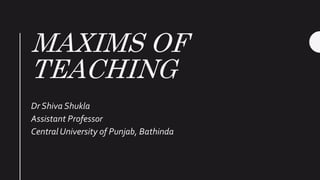
Maxims of teaching
- 1. MAXIMS OF TEACHING Dr Shiva Shukla Assistant Professor Central University of Punjab, Bathinda
- 2. Maxims of Teaching • Maxims are short statements like a dictum that are treated as general rule of conduct • Universal facts found out by teachers after years of experience • They are culture free and universal in nature • They are tried and tested principles • They accelerate momentum of teaching-learning process and help in achieving success in a classroom
- 3. Maxims of Teaching Maxims are short statements like a dictum that are treated as general rule of conduct • From Known to Unknown • From Simple to Complex • From Concrete to Abstract • From Particular to General • FromWhole to Part • From Psychological to Logical • From Induction to Deduction • From Empirical to Rational • FromAnalysis to Synthesis
- 4. From Known to Unknown • Knowledge must be given by linking it to previous knowledge • To enable the teaching-learning process and classroom progress • Called as the basic and primary of all the maxims • While introducing the class with the topic, initial teaching phase • Minimal piece of knowledge which students are already aware about • Buying and Selling (Known) Profit and Loss (Unknown)
- 5. From Simple to Complex • Simple concepts are taught first and complex ideas and concept later • Easy concepts and teaching points are introduced first and difficulty level to be increased gradually • This maxim helps in keeping the attention of students in the class • Culture (Simple) Socio-Cultural Processes (Complex) • Simple interest (Simple) Compound Interest (Complex) • Addition (Simple) Subtraction (Complex)
- 6. From Concrete to Abstract • From actual tangible objects that can be visualized and be verified by five senses (sight, sound, smell, touch and taste) to more intangible abstract ideas that needs intuitive interpretation and can’t be seen or touched directly • Based on cognitive development of the students • Water Bodies (Concrete) Ocean Currents (Abstract) • Counting with Abacus (Concrete) BODMAS (Abstract)
- 7. From Particular to General • From particular statement, specific concept or subject matter to more generalized principles • Experiment (Particular) Implications (General) • Poem by Shakespeare (Particular) Structure of Sonnet (General) • Reference to Context (Particular) Moral of the story (General)
- 8. From Whole to Part • The student should be acquainted with complete lesson, chapter, concept, theory or idea first and then breakdown different elements for discussion • Introduction to the complete topic then • Prose (Whole) explanation of every paragraph (Part) • Poetry (Whole) Word Exposition (Part)
- 9. From Psychological to Logical • Basic principles of psychology like students interest, aptitude, memory, creativity, attitudes, developmental needs and levels, aspirations etc. to be kept in consideration for selection of subject matter and sequential arrangement of the content and then later to the logical arrangement of the content. • Student-centred Maxim and most effective among child learner • Incorporation of subject matter of students interest (Psychological) Completing the lesson with assigned evaluation work (Logical)
- 10. From Induction to Deduction • Inductive reasoning is supplying some evidence or argument to conclude to the truth. Broad generalizations are made from definite observation. • Deductive Reasoning is when every possibilities are examined to reach to a valid conclusion. • Aryan ethnicity were horse riders. Horses were found in Central Asia. Therefore,Aryans came from Central Asia. ( Inductive) • Where did Aryans ethnicity come from? DNA evidence, Archaeological findings, archival texts etc. somewhat indicating a conclusion (Deductive)
- 11. From Empirical to Rational • Empirical Knowledge is based on verifiable observable experiences. It is based on results and observations. • Rational Knowledge is based on reasons and logic. Only reasoning and reflections can be used as evidence to prove • Rules and Norms (Empirical)Values and Ethics (Rational) • Environmental Pollution (Empirical) Future implications of Pollution (Rational)
- 12. From Analysis to Synthesis • Analysis is process of breaking down an idea, concept or phenomenon into its constituent element • Synthesis is compounding of various ideas, concept or phenomenon to form a theory or system • Evaporation, Condensation, Precipitation (Analysis) Water Cycle (Synthesis)
